Calisthenics is a high-intensity workout that requires a lot of energy. To unleash your full potential in calisthenics, you need to fuel your body with the right nutrients.
The ideal diet for calisthenics is all about providing your body with the optimum nutrition it needs to perform at its best. With the right diet, you can boost your energy levels, enhance your performance, and maximize your gains.
Key Takeaways:
- The right diet is essential for optimum performance in calisthenics
- Proper nutrition can help you boost your energy levels and enhance your performance
- An ideal calisthenics meal plan should include macronutrients such as protein, carbohydrates, and healthy fats
- Calisthenics nutrition varies depending on your personal goals, body type, and fitness level
- By incorporating the right foods and supplements into your diet, you can build muscle, lose weight, and achieve your desired fitness outcomes.
Understanding the Importance of Calisthenics Nutrition
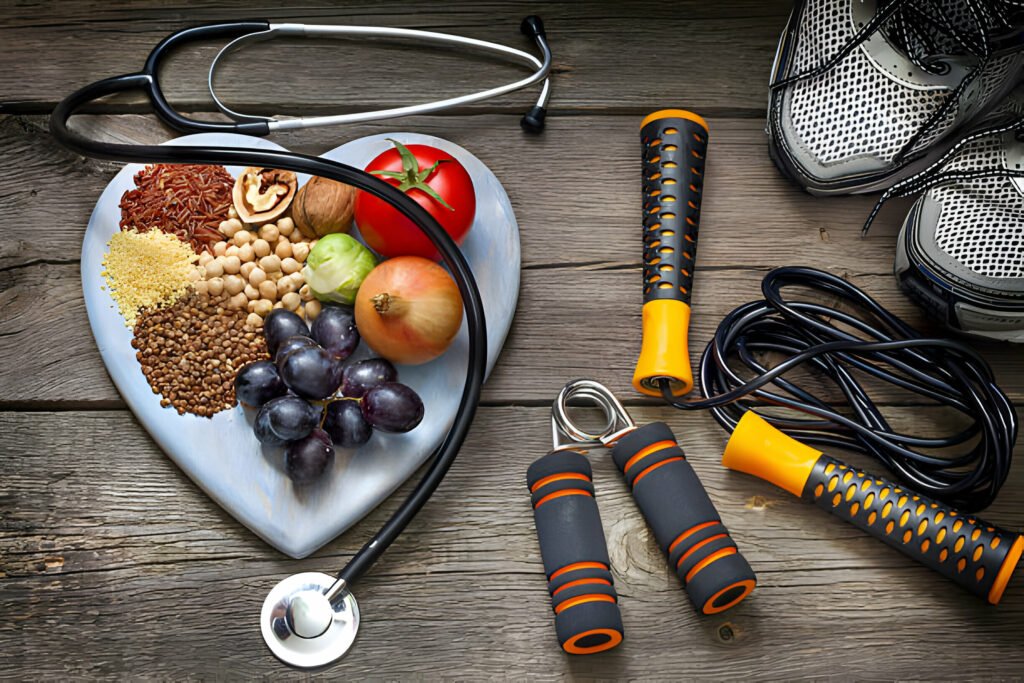
Achieving your calisthenics goals requires more than just a rigorous workout routine. The right nutrition is essential to fuel your body and promote optimal performance and recovery.
In this section, we will explore how to develop a calisthenics meal plan that emphasizes clean eating and macronutrient balance.
The Importance of Clean Eating for Calisthenics
Clean eating is a critical component of calisthenics nutrition. This philosophy emphasizes the consumption of wholesome, unprocessed foods, such as fresh fruits and vegetables, lean proteins, and whole grains.
By avoiding processed foods and added sugars, you can fuel your body with the nutrients it needs to perform at its best.
The Role of Macronutrients in Calisthenics Nutrition
| Macronutrient | Function | Food Sources |
| Protein | Rebuilds muscle tissue, supports muscle growth | Chicken, fish, eggs, nuts, beans |
| Carbohydrates | Provides energy for workouts and aids in recovery | Whole grains, fruits, vegetables |
| Fats | Provides energy, supports hormone production | Avocado, nuts, seeds, olive oil |
Macronutrients are the building blocks of a well-rounded calisthenics meal plan. Protein is essential for repairing muscle tissue and promoting muscle growth, while carbohydrates provide energy for workouts and help with recovery.
Good sources of healthy fats, such as avocado and nuts, provide additional energy and support hormone production.
Developing a Calisthenics Meal Plan
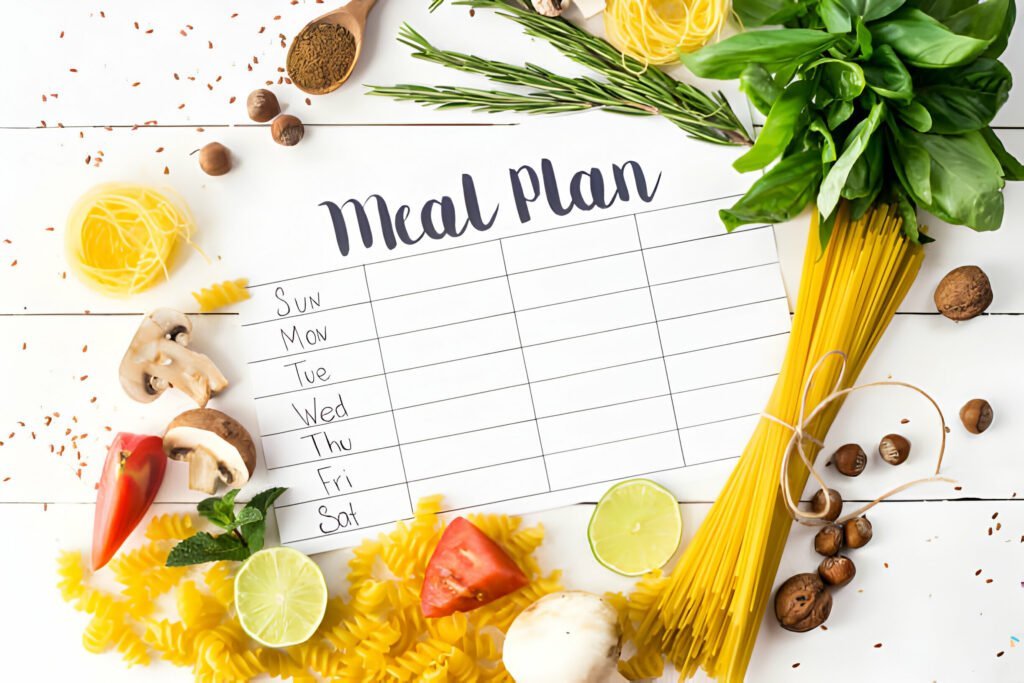
The key to creating an effective calisthenics meal plan is to focus on whole, nutrient-dense foods. Start by calculating your daily caloric needs and dividing them among the three macronutrient groups.
Aim to consume a balance of protein, carbohydrates, and fats at each meal, and prioritize fresh fruits and vegetables.
Meal prepping can also be a useful strategy for ensuring you stick to your calisthenics meal plan. Prepare your meals in advance and portion them out so you can easily grab a healthy option when you’re on the go.
In Summary
- A calisthenics meal plan should emphasize clean eating and macronutrient balance.
- Clean eating involves consuming whole, unprocessed foods while avoiding added sugars.
- Macronutrients, such as protein, carbohydrates, and fats, are essential for fueling your body and supporting muscle growth.
- Developing a calisthenics meal plan involves calculating your daily caloric needs and dividing them among the three macronutrient groups while prioritizing fresh fruits and vegetables.
- Meal prepping can be a useful strategy for staying on track with your calisthenics nutrition goals.
Fueling Your Body for Calisthenics Performance

When it comes to calisthenics, a healthy diet is essential for optimal performance. Here are some calisthenics diet tips to help you fuel your body effectively and ensure you get the most out of your workouts.
Pre-workout Nutrition
Eating the right foods before your workout can provide you with the energy and nutrients you need to power through your routine.
Consider consuming a mix of carbohydrates and protein 60 to 90 minutes before your workout for sustained energy and muscle support. Good options include a whole-grain toast with peanut butter, a protein smoothie or a piece of fruit with Greek yogurt.
Post-workout Nutrition
After a workout, it’s important to replenish your body with nutrients and electrolytes to aid in muscle recovery and reduce soreness. Focus on consuming carbohydrates and protein within 30 minutes of your workout to optimize the recovery process.
A protein shake with fruit, a turkey sandwich on whole-grain bread or a quinoa bowl with veggies and chicken are all great choices for post-workout meals.
Hydration
Staying hydrated is key to maintaining your energy levels during calisthenics workouts. Drink plenty of water before, during and after your workout to help regulate your body temperature and prevent dehydration.
Clean Eating
Adopting a « clean eating » approach can help you maintain a healthy weight and fuel your body with the nutrients it needs. Focus on consuming whole, unprocessed foods that are rich in vitamins and minerals. Incorporate plenty of fruits, vegetables, lean protein and whole grains into your diet.
Portion Control
While it’s important to eat a balanced diet, it’s also important to practice portion control. Overeating can lead to weight gain, which can negatively impact your calisthenics performance. Use smaller plates, avoid distractions during meals and listen to your body to avoid overeating.
Meal Prepping
Planning and prepping your meals in advance can help you stay on track with your calisthenics nutrition goals. Set aside a day each week to prep healthy meals and snacks that you can grab on-the-go.
This will help you avoid unhealthy fast food options and ensure you always have healthy options available.
Calisthenics Nutrition for Weight Loss
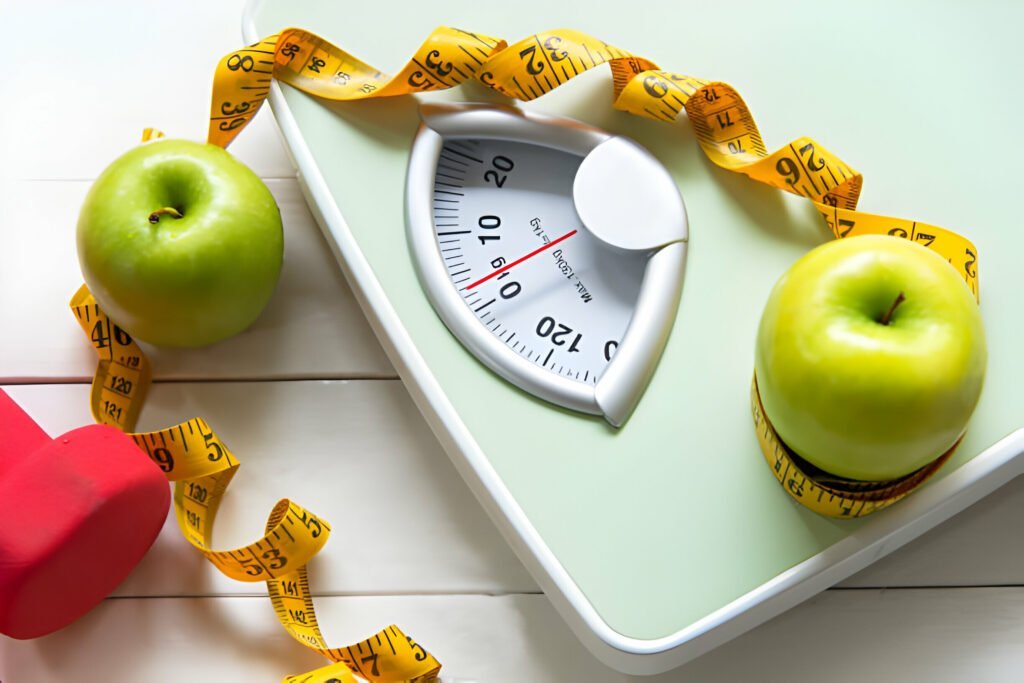
Calisthenics is a fantastic way to lose weight while building strength and flexibility. However, without the proper nutrition, you may find it challenging to reach your weight loss goals. Here are some dietary strategies to help you lose weight while practicing calisthenics:
Calorie Deficits
The key to weight loss is creating a calorie deficit, which means burning more calories than you consume. Calculating your daily caloric needs can be done using online calculators or consulting with a healthcare professional.
Once you know your daily caloric needs, aim to consume 500 to 1000 calories less than your daily requirement to lose 1-2 pounds per week.
Nutrient Timing
When it comes to weight loss, timing is everything. Eating the right foods at the right times can help you optimize your metabolism and burn more calories. Try to consume most of your carbohydrates during breakfast and after your workout to fuel your body for exercise and aid in recovery.
Make dinner your smallest meal of the day, focusing on protein and vegetables to help stabilize your blood sugar and prevent nighttime snacking.
Foods to Incorporate
When attempting to lose weight, it is essential to focus on nutrient-dense foods that satisfy your hunger and keep your energy levels high. Here are some examples of foods that you should incorporate into your diet:
| Food | Benefits |
| Lean Protein (chicken breast, fish, tofu) | Supports muscle growth and repair, keeps you feeling full |
| Healthy Fats (avocado, nuts, olive oil) | Provides energy and helps regulate hormones |
| Complex Carbohydrates (whole grains, fruits, vegetables) | Provides fuel for exercise and helps regulate blood sugar |
| Water and Herbal Tea | Hydrates the body, aids in digestion, and helps energy levels |
Remember to also limit your intake of processed foods, sugary drinks, and alcohol, which can sabotage your weight loss efforts.
Building Muscle with a Calisthenics Diet
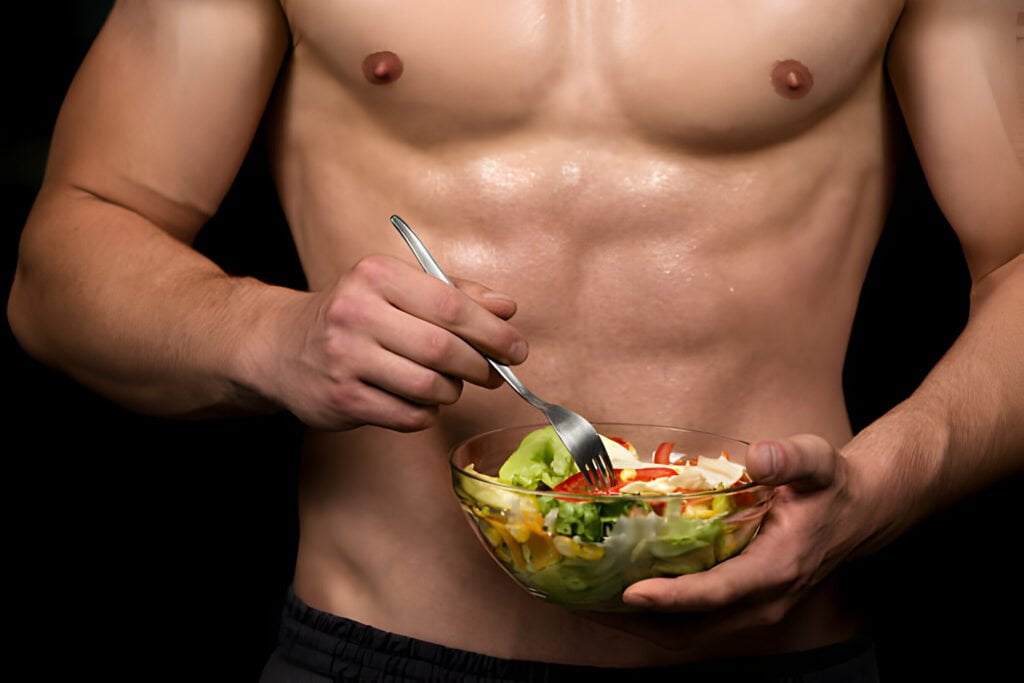
If your goal is to build muscle through calisthenics, then it’s essential to fuel your body with the right nutrients. In this section, we’ll discuss the key principles of a muscle-building diet and how they apply to calisthenics training.
Protein
Protein is the foundation of any muscle-building diet. It’s made up of amino acids, which are the building blocks of muscle tissue. As such, it’s important to consume enough protein to support your muscle growth.
A good rule of thumb is to consume 1 gram of protein per pound of body weight per day. So, for example, if you weigh 150 pounds, you should aim to consume 150 grams of protein per day. Some good sources of protein for calisthenics athletes include:
- Chicken breast
- Turkey breast
- Lean beef
- Eggs
- Greek yogurt
- Cottage cheese
- Plant-based protein powders
Carbohydrates
Carbohydrates are an important energy source for anyone who engages in regular exercise. They are particularly important for calisthenics athletes, who require explosive power and endurance.
It’s important to consume complex carbohydrates, such as whole grains, fruits, and vegetables, rather than simple carbohydrates, such as sugar and refined flour. This will help to keep your energy levels stable and provide your body with the fuel it needs to perform at its best.
Fats
Fats are an important component of a muscle-building diet. They provide energy, help to regulate hormones, and support recovery and repair.
It’s important to consume healthy fats, such as those found in nuts, seeds, avocado, and fatty fish. Avoid trans fats and limit your intake of saturated fats.
Supplements
While it’s always best to get your nutrients from real food, supplements can be a helpful way to ensure you’re getting everything you need to support your muscle growth.
Some good supplements for calisthenics athletes include:
- Whey protein powder
- Creatine
- Branched-chain amino acids (BCAAs)
- Fish oil
Remember, supplements should be used to supplement a healthy, balanced diet, not to replace it.
Creating an Individualized Calisthenics Meal Plan
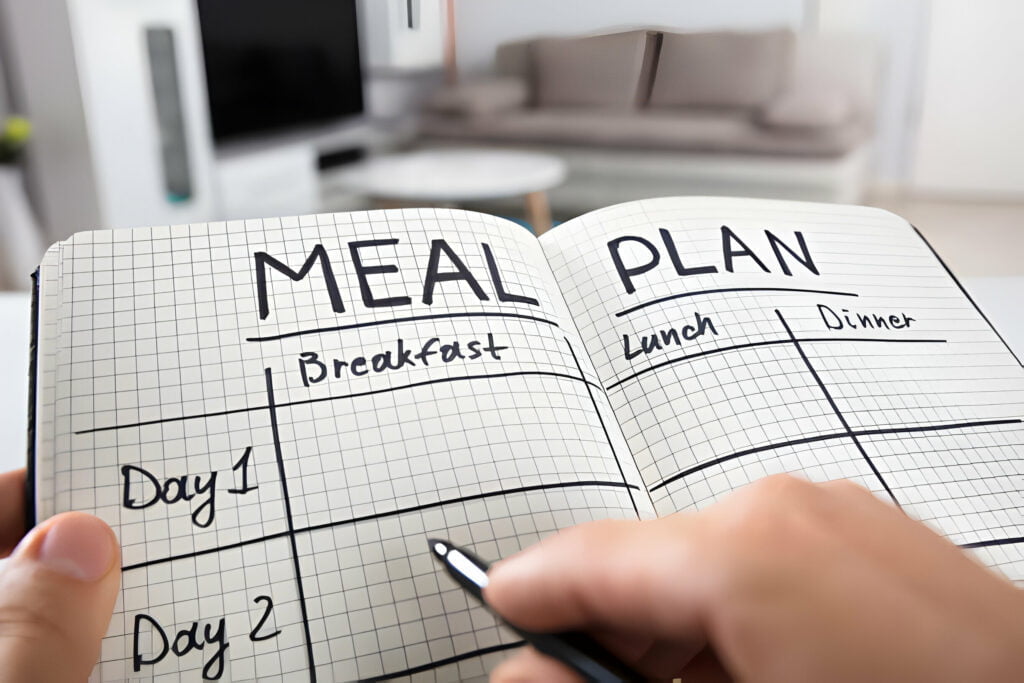
Every calisthenics athlete has unique nutritional needs. Creating an individualized calisthenics meal plan is key to ensuring you are fueling your body effectively. Here are some tips to help you create your own customized calisthenics nutrition plan:
Consider Your Goals
The first step in creating your personalized calisthenics meal plan is to consider your fitness goals. Do you want to build muscle, lose weight, or improve overall performance? Your nutritional needs will vary depending on your specific objectives.
Calculate Your Caloric Needs
In order to build an effective meal plan, you need to know your daily caloric needs. Calculating your basal metabolic rate (BMR) is a good starting point.
Online BMR calculators are available to help you determine the number of calories you burn at rest. From there, you can adjust your caloric intake based on your activity level and goals.
Choose Whole Foods
When it comes to calisthenics nutrition, whole foods are the best choice. They provide a wide range of essential nutrients, including fiber, vitamins, and minerals. Examples of whole foods include fruits, vegetables, legumes, whole grains, and lean proteins like chicken and fish.
Structure Your Meals
Structuring your meals is essential to optimizing your calisthenics performance. It’s recommended to eat small, frequent meals throughout the day, rather than three large meals.
This approach provides your body with a steady stream of energy, helping you avoid energy crashes and fatigue during workouts.
Meal Prep and Planning
Meal prepping and planning is a great way to ensure you are sticking to your calisthenics nutrition plan. Take time each week to prepare healthy meals and snacks in advance. This will help you avoid reaching for unhealthy options when you’re short on time.
Supplement as Needed
If you’re struggling to meet your nutritional needs through whole foods alone, supplements can be a helpful addition to your calisthenics nutrition plan. Consult with a registered dietitian or healthcare professional to determine which supplements are right for you.
By following these tips, you can create a personalized calisthenics meal plan that helps you achieve your fitness goals. Remember, consistency is key in calisthenics nutrition. Stick to your meal plan and monitor your progress to make adjustments as needed.
Conclusion
In conclusion, optimizing your fitness with the ideal diet for calisthenics is crucial to reaching your full potential in this dynamic form of exercise. By fueling your body with the right nutrients, you can enhance your performance, increase your energy levels, and achieve your desired fitness outcomes.
Remember to prioritize clean eating, macronutrient balance, and nutrient timing in your calisthenics meal plan. Whether your goal is weight loss, muscle building, or overall health and fitness, there are specific dietary strategies that can help you reach your goals.
Start Your Calisthenics Journey Today
Don’t be afraid to experiment with different foods and meal structures to find what works best for you. And remember, building a strong foundation with proper nutrition is just the beginning. Consistent training, rest, and recovery are also essential components of a successful calisthenics practice.
So what are you waiting for? Start your calisthenics journey today and unlock a new level of strength and agility. With the right diet and training regimen, you can achieve anything you set your mind to.
FAQ
What is the ideal diet for calisthenics?
The ideal diet for calisthenics consists of a well-balanced combination of protein, carbohydrates, and healthy fats. It is important to fuel your body with nutrient-dense foods to support your energy levels and enhance your performance.
How does calisthenics nutrition contribute to my fitness goals?
Calisthenics nutrition is crucial for achieving your fitness goals as it provides the necessary fuel and nutrients for your body to perform at its best. With the right nutrition, you can optimize your energy levels, support muscle growth and recovery, and improve overall performance.
Can I follow a calisthenics meal plan?
Yes, following a calisthenics meal plan can be beneficial as it helps you structure your meals and ensure you are getting the right balance of nutrients. A meal plan can also aid in portion control and make it easier to stay consistent with your nutrition goals.
What should I eat before and after a calisthenics workout?
Before a workout, it is recommended to consume a combination of carbohydrates and protein to provide energy and support muscle function. After a workout, focus on consuming a post-workout meal or protein shake to aid in muscle recovery and replenish glycogen stores.
How can I incorporate calisthenics nutrition into a weight loss plan?
To incorporate calisthenics nutrition into a weight loss plan, focus on creating a calorie deficit by consuming fewer calories than you burn. Emphasize whole, nutrient-dense foods, and prioritize protein to support muscle maintenance. Additionally, consider incorporating intermittent fasting or time-restricted eating for further weight loss benefits.
Can I build muscle through calisthenics with the right diet?
Yes, building muscle through calisthenics is possible with the right diet. Ensure you are consuming enough protein to support muscle growth and recovery. Additionally, consider incorporating resistance bands or weighted calisthenics exercises to increase the intensity and challenge your muscles.
How can I create a personalized calisthenics meal plan?
To create a personalized calisthenics meal plan, consider your individual goals, dietary preferences, and nutrient needs. Determine your calorie requirements and macronutrient ratios, and then plan meals that include a variety of whole foods. Experiment with different recipes and meal prep strategies to find what works best for you.
